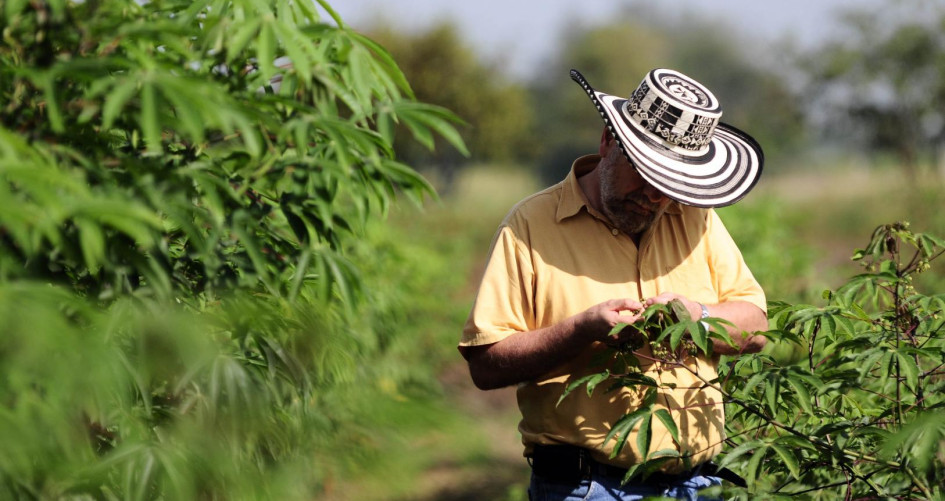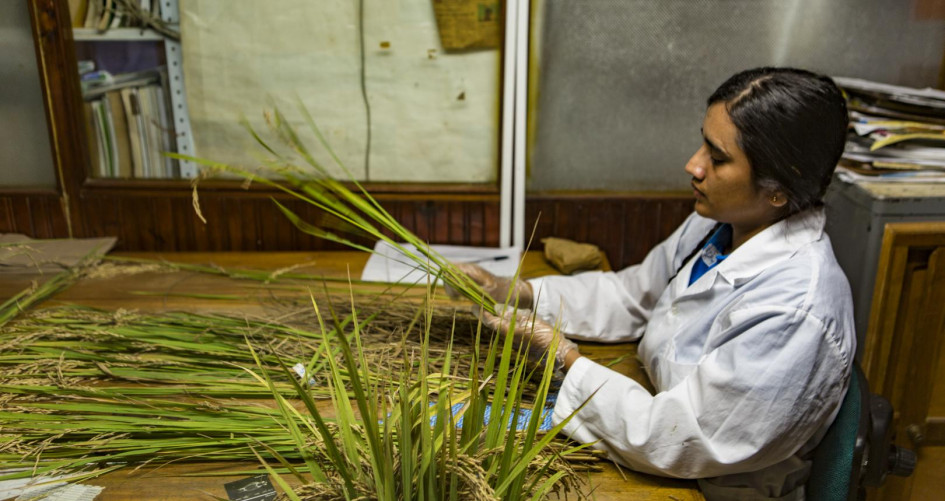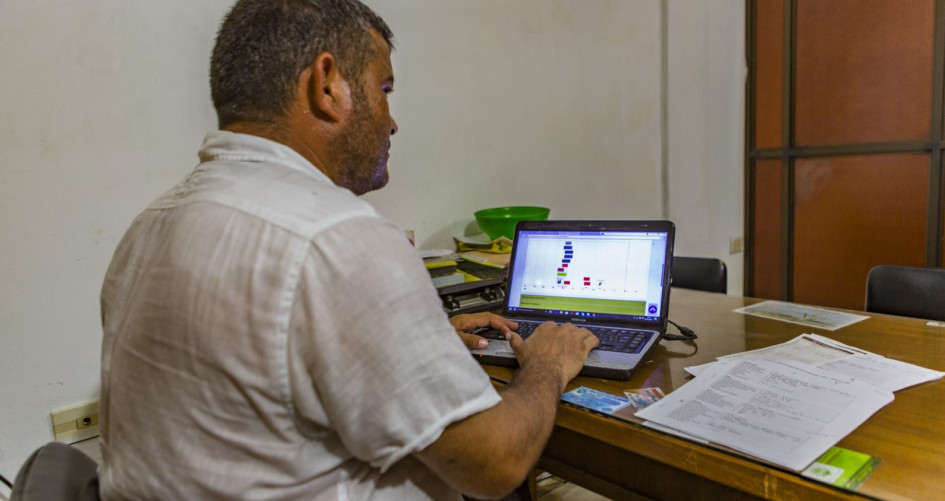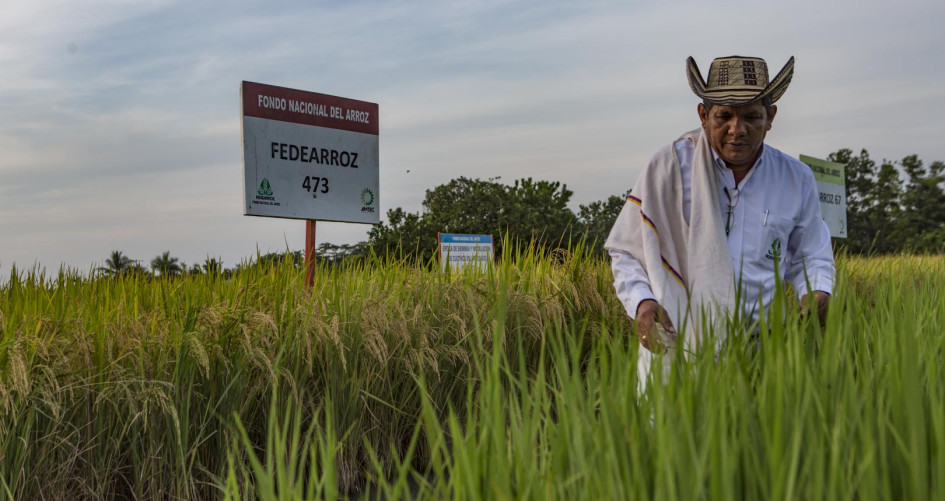Agriculture is highly dependent upon the climate. Changes in the frequency and severity of droughts and floods pose challenges for farmers and threaten food security. Unpredictable, shifting weather patterns, and extreme weather events can harm crops and reduce yields.
A partnership between the International Center for Tropical Agriculture, the CGIAR Research Program on Climate, Agriculture and Food Security and more than 10 partners including the Colombian Ministry of Agriculture and Rural Development and the Honduran Secretariat of Agriculture and Livestock have developed a suite of ICT tools and applications to help farmers in Colombia and Honduras make climate-smart decisions.
The tools and applications enable technicians from farmer organizations to collect, analyze, and deliver information that allow farmers to understand variations in seasonal climate conditions, and thus adjust their management practices to cope with them. Guided by this information, farmers now know whether to plant, when to plant and specifically which crops or crop varieties to plant. In addition, they have site-specific information on how much water and agrochemicals to use. This increases agricultural productivity, food and income security, and allows for more sustainable farming.
Key facts
- More than 10 public and private organizations from Colombia and Honduras are participating in the project;;
- About 300,000 farmers, mostly growing maize, beans, rice, fruit trees and coffee, are being reached with climate and/or crop management information;
- In each country, partners produce ten or more monthly bulletins related to agro-climatic conditions or food security.
The problem
Farming communities rarely have access to up-to-date weather and climate information, which hinders their ability to practice climate-smart agriculture. Extreme weather events or interannual variations in rainfall and temperature can result in reduced yields or even the destruction of crops, affecting farmers’ incomes and livelihoods. Unsustainable agricultural practices compound the problem by reducing in soil fertility and the soils’ capacity to retain water, contributing to soil erosion. This can drive ecosystem degradation and habitat loss, with a resulting loss of biodiversity.
The solution
The International Center for Tropical Agriculture (CIAT) in partnership with the CGIAR Research Program on Climate Change, Agriculture and Food Security (CCAFS) and more than 10 partners from Colombia and Honduras have developed a suite of ICT tools and applications to address climate variability in these two countries, with important lessons for resilient and sustainable agriculture in Latin America.
Partners and donors include: the Colombian National Federation of Rice Growers; Colombian Association for Fruits and Vegetables; the National Federation of Cereal and Grain Legume Growers; the Colombian National Institute of Hydrology, Meteorology, and Environmental Studies; National Directorate of Science and Technology, Honduras; Agronet; Local Technical Agro-climatic Committees; the Honduran Permanent Committee for Contingencies; the Honduran Secretariat of Agriculture and Livestock; the Colombian Ministry of Agriculture and Rural Development; the Climate Services for Resilience Development Program of the U.S. Agency for International Development; and The Nature Conservancy.
This initiative has developed and uses a wide range of tools to collect, analyze and disseminate information, and has been deployed in Colombia and Honduras since 2013. Tools include agronomic data capture, on-farm data visualization, and machine learning analysis; meteorological data curation, crop modeling and seasonal climate forecasting. Importantly, an automated seasonal agro-climatic forecast platform publishes monthly agro-climatic bulletins, and produces up-to-date monthly forecasts and management recommendations.
Novel seasonal climate forecasting software allows farmer organizations and the National Meteorological Offices to improve their efficiency, and to automate large numbers of climate forecast model runs (for example, for many localities). New software tools are accompanied by training courses to empower farmers’ organizations in their use. By using these tools farmers can, for example, adjust sowing periods to take advantage of optimal soil conditions, rainfall, and sunlight to boost yields and/or avoid losses.
Helping planet
Climate is responsible for 30 % of productivity variations globally. Extreme weather or changes in rainfall and temperature can result in crop damage, which impacts farmers’ incomes and food security. Also, unsustainable agricultural practices can lead to high greenhouse gas emissions, reductions in soil fertility, loss of water retention capacity, and eventual soil erosion. Innovative solutions to understand and utilize climate information are helping farmers in Colombia and Honduras adapt their practices to climate variability and change and making more efficient use of water and agrochemicals.
Helping people
Through this initiative, an estimated 300,000 farmers now have access to climate and/or crop management information. Many of these farmers are making better decisions on how, when and where to plant and sometimes, whether it is feasible to plant at all. By utilizing climate and crop information, mostly based on analysis of past cropping events as well as on forecast-driven recommendations of best varieties and planting dates at site-specific level, farmers involved in the initiative are sustainably increasing productivity, and becoming more resilient to climatic events.
Also, farmer organizations have been empowered by having access to knowledge on the tools and methods used by the initiative and training to enable them to capture, analyze and deliver knowledge and recommendations to farmers. The participation of governments, research institutions and growers’ associations has guaranteed the participation of thousands of farmers.
Spillover effect
Given the success of this initiative in Colombia and the urgency to address agro-climatic risks especially at the local level, while reducing greenhouse gas emissions, the Government of Colombia decided to include in its National Determined Contribution the establishment of at least 15 Local Technical Agro-climatic Committees as a measure to promote food security, enhance adaptation and reduce greenhouse gas emissions. This success has already allowed expansion into Honduras, where seven agro-climatic committees have been established. Funding for applied research and capacity building for the Secretary of Agriculture and Livestock and COPECO (National Meteorological Service) has also been secured.
In Honduras, the activities are still in their infancy; however, there is the potential to reach some 25% of coffee farmers in the country. In Mexico, CIAT is working with the International Center for Maize and Wheat Improvement to improve site-specific management for maize farmers. Other countries in Latin America are also being provided with information, including Peru, Nicaragua and Guatemala, and various countries in Asia (the Philippines, Vietnam, Cambodia, and Laos).
As a result of this initiative, climate information services are both a reality and game changer for farmers in Colombia and Honduras, and will soon be for farmers in many other countries.




Images owned by the activity partners, all rights reserved.









